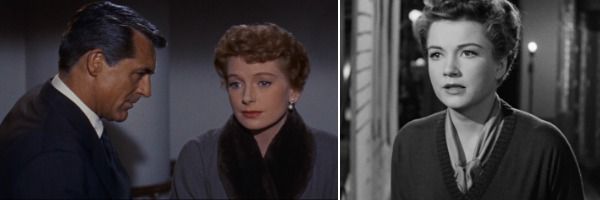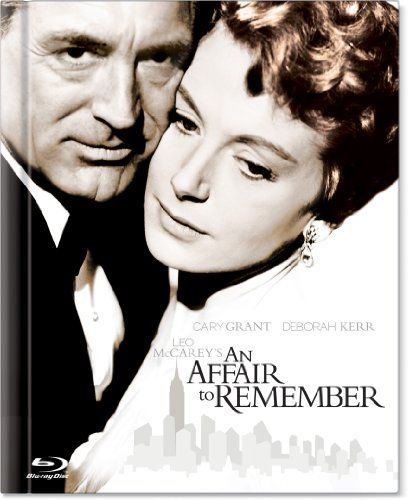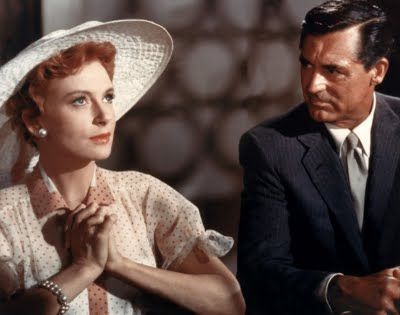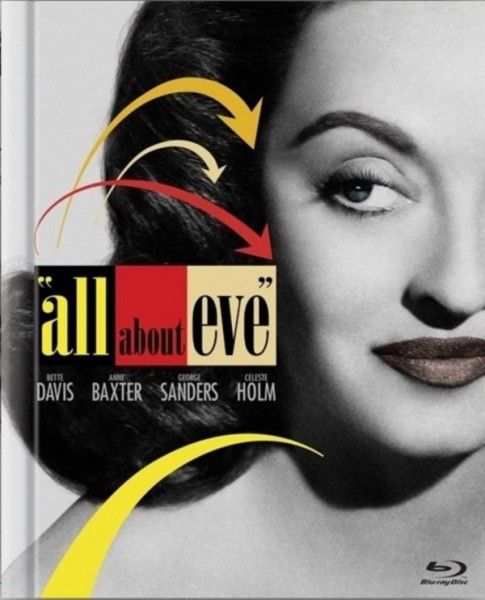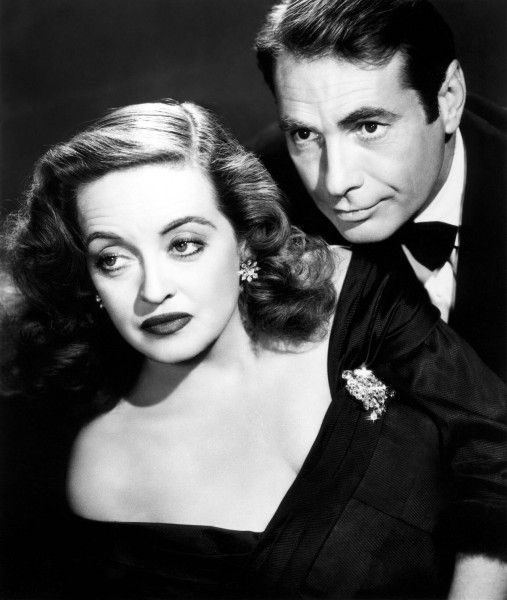It’s February, which makes this the time for romantic catalog titles to be reissued. For 20th Century Fox, it’s the perfect time to put out classics like An Affair to Remember and All About Eve. All About Eve isn’t all that romantic, but the 60th anniversary of the film was last year, so I guess it’s still sort of the 60th anniversary. Affair stars Cary Grant and Deborah Kerr as a playboy and a singer, respectively, who meet on a long boat ride and fall in love, while Eve stars Bette Davis as Margo Channing, who takes in the titular Eve Harrington (Anne Baxter) as an apprentice only to find that her motivations for getting close are not entirely noble. My review of both An Affair to Remember and All About Eve on Blu-ray after the jump.
1957’s An Affair to Remember must have been a favorite Nora Ephron, as it was heavily referenced in Sleepless in Seattle, which led to a renewed interest in the movie and a remake in 1994 starring Warren Beatty. The remake had the title Love Story – which was the title of the 1939 film Affair was itself remaking. Leo McCarey directed both the ’39 and ’57 versions, and he might be best known as the director of Duck Soup – or at least was until recently when Criterion put out his Make Way for Tomorrow. Such has led some auteurist circles to reconsider McCarey – or at least make his case more public. To be fair, he directed at least two masterpieces, as Make Way for Tomorrow is a special movie, and deserves its re-appreciation.
I don’t think An Affair to Remember is a masterpiece, though I do think it showcases the work of a major talent with a minor title. Cary Grant stars as Nickie Ferrante, an international playboy known for his conquests and his current heiress fiancé. He’s on the boat with nightclub singer Terry McKay (Deborah Kerr), and they have nothing but time on the boat to get to know each other. She too is engaged to be married, and so their friendship – while scrutinized by the other passengers - begins somewhat innocently. But as they spend time together and eventually meet his grandmother Janou (Cathleen Nesbit), their relationship deepens and Nickie starts to figure out who he wants to do with his life. After the boat ride, they plan to get together in six months, and then get married after they meet at the Empire State Building. Tragedy ensues, which keeps Terry from meeting Nickie, which leads to bitterness, but then hope.
This is a romance film (it’s not really funny enough to call it a romantic comedy), and so much of the machinations of the film feel very familiar and route, but McCarey has a light touch. There are a number of wonderful grace notes as the director seemed to enjoy playing with the widescreen frame, so in one sequence people on the boat don’t know where to look, and so he fills the frame with people turning their heads from left to right. Affair’s also one of those films that couldn’t exist in the modern world. Even if a famous person took a boat ride, there would undoubtedly be some form of gossip journalist, or iPhone video that would ruin the couple’s chances of having alone time. Also, the two never exchange information - again, this is a period piece.
But if you’ve ever wanted to see a performer in control of his powers as a star, watch Cary Grant in the last ten minutes of the film. Having been denied contact with the woman he loves, he has an exchange with her that reveals his character and his soul in such a way that you understand why generations have idolized Grant. It’s the perfect show of weakness in strength, and Grant gets the absolute right mixture of anger and sorrow. It’s a scene that has to be perfect for the film to work, and if the film feels a bit saggy at times (especially in the third act when Kerr teaches children to sing… seriously, it’s got some schmaltz) you can forgive the film its dalliances when it connects so strongly at the end.
Fox became slightly more aware/proud of this film after Sleepless re-launched it, and their widescreen presentation here shows that they have invested in the title, though it has the color scheme of a lot of early cinemascope films, so I don’t feel like it pops so much as a lot of great Technicolor efforts. The colors are well represented, and it has a pastel, slightly faded quality that compliments the film – likely that’s as good as it can look. It’s presented in its original aspect ratio (2.55:1) and in English 5.1 DTS-HD and English Stereo, both sound fine, thought the DTS mix is limited in how thorough the surround can be (musical numbers benefit most). The film also comes with a commentary by singer Marni Mixon and historian Joseph McBride. It’s a good track, with McBride offering insights that nearly fall into the trap of explaining what’s on screen, but only just. Nixon does a good job of parsing her role working under Kerr as her singer-ringer. There are a series of featurettes titled “Affairs to Remember” for Deborah Kerr (6 min.) that talks to her husband, and one for Cary Grant (10 min.), which talks to his widow. “Directed by Leo McCarey” (23 min.) gives the filmmaker his due with comments from film historians Scott McIsaac, Wes Gehring, Paul Harrill, Rick Jewell and director Peter Bogdanovich. They give the filmmaker his propers, with special attention to this film. “A Producer to Remember: Jerry Wald” (16 min.) gets Malvin Wald to talk about his brother, Robby and Andrew Wald to talk about their father, Constance Wald to talk about her late husband, and additional comments from writer Richard Baer. “The Look of An Affair to Remember” (9 min.) gets John Cork, Bogdanovich, Jewell and Gehring talking about the look and use of widescreen in the movie. There’s also a AMC behind the scenes (24 min.), and a Fox movietone news piece (1 min.). Rounding out the set is a theatrical trailer.
All About Eve is such a wonderful film that there’s really only one complaint that can be made about it, and that’s that its director Joseph L. Mankiewicz was never much of a visual storyteller. He’s competent behind the camera, for sure, but he never developed much as a visionary. But like Preston Sturges, his work is functional, and the dialogue crackles so strongly that it’s like complaining that Peckinpah wasn’t funnier.
Watching All About Eve again, I’m curious when Bette Davis’s Margo Channing became the defacto model for camp. Granted, Mae West was one of the first female female impersonators, but this role - the woman whose career is coming to an end, and to whom age is nipping at her toes - strikes as the ne plus ultra iteration of this type. When Margo gets drunk in the middle of the film and bellows “Fasten your seatbelts, it's going to be a bumpy night!” a gay icon was born. Perhaps it’s the mixture of anger and futility that resonated so strongly with certain audiences. There was nothing Margo could do about her star fading, but she wouldn’t go quietly in the night. But it’s interesting that the challenge facing Margo isn’t the character played by Marilyn Monroe – an actress on her way to sleeping to the middle – but by Anne Baxter’s Eve. It’s someone with talent, someone who cares about her craft, someone who can mimic and has actual talent.
Watching the film again, I found myself more sympathetic than I had ever been before for the Eve character. Eve enters into Margo’s life a fan who watches her every production. She then gets introduced to Margo by Karen Richards (Celeste Holm), who is married to playwright Lloyd Richards (Hugh Marlowe). Eve becomes Margo’s assistant, than understudy, than looks to supplant her as she keeps climbing the ropes. Observing from the side is critic Addison DeWitt (George Sanders), who is put into play with some of the machinations Eve puts on to get ahead.
I guess the thing that seems nto really the film’s focus the first time around is that Eve must be fairly good. She is lying and deceitful to get where she’s going, but the end of the film puts her in a sting when she tries to use her sex one too many times, and traps her. But though Thelma Ritter and Marilyn Monroe make great comic impressions, the film is about the three strongest characters: Eve, Margo, and Addison. In the end, Eve can only climb so high and is caught in a glass jar by Addison. Never before had I felt so much sympathy for that character. I don’t know how earned it is, but it was fun to watch the movie from that perspective. The film also sets up that there will be someone else pulling the same thing, suggesting a cycle. Was Margo ever an Eve? Is Eve the pupa stage?
At the end of the day, the film is a lot of fun to sink your teeth into because the writing is so good. This is great dialogue, and the film is endlessly quotable. It also won thirteen academy awards in its era, so it’s credentialed. If you haven’t seen it, it’s definitely a classic for a reason.
20th Century Fox’s Blu-ray presents the film in its original 1.33:1 aspect ratio and in both 5.1 DTS-HD and original mono. I’m not that much of a sound purist, though the DTS mix can only do so much with the movie, but it never gets in the way, and the soundtrack is crisp, if that’s your thing. Milton Krasner cinematography is well represented here, and the black and white picture has never looked better. The film comes with a commentary by Celeste Holm, biographer Ken Geist and Christopher Mankiewicz, and a second commentary by Sam Staggs. There’s also an isolated score 5.1 DTS track. The Staggs track is deliciously gossipy and both tracks are fun to listen to.
The supplements are nice and extensive, the featurettes start with “Directed by Joseph L. Mankiewicz” (25 min.) with Rosemary, Tom and Chris Mankiewicz, and historians Kenneth L. Geist and Rick Jewell to talk lovingly and learnedly about the director’s career. This is followed by “Joseph L. Mankiewicz: A Personal Journey” (26 min.) that has the same cast of characters talk about his biography. This is followed by “The Real Eve” (18 min.) which gets Jonathan Kuntz, Harry Haun and Rosemary Mankiewicz talking about how the film was based on real Broadway events. “The Secret of Sarah Siddons” (7 min.), showcases how the start of the film – an award ceremony – is not fiction, and it’s followed by an AMC backstory on the film (24 min.), a vintage Bette Davis (1 min.) and Anne Baxter (1 min.) interviews, four Movietone news pieces (9 min.) and the film’s theatrical trailer.

